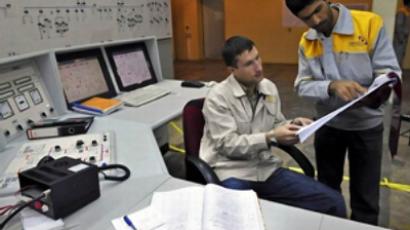Race is on for Arctic treasures
The US, Canada and Russia have launched competing expeditions to map the bottom of the sea near the North Pole.
Canadian Arctic researcher Edward Struzik shared some details behind the unlikely US-Canadian partnership.
“Canada and the US do have a disagreement over one area: the Beaufort Sea, which contains a lot of oil and gas. But they have set those differences apart because they don't really have the icebreaker power to do the job that is necessary to do in a short period of time. They say: ‘Let's get on with it’, because the Russians are very far ahead of the game, the Norwegians have already done their work and Denmark has done a very good job as well,” Struzik told RT.
More than a third of the world's undiscovered gas and a tenth of its oil reserves are estimated to be in the region. So the race is on to claim ownership of the pole.
“The oil there is expensive right now, but for countries like the US it is a matter of energy security,” said Dr. Iosif Diskin, chairman of the National Strategy Council. “It will give Americans uninterrupted energy supplies regardless of any conflicts anywhere in the world.”
“The ability of a country to stake its place there will determine its prosperity in the coming decades,” argued Arkady Tishkov, deputy director of the Geographic Institute.
But it is not yet clear how the pie will be divided between the five nations closest to the North Pole.
The easiest way to gain economic rights to significant portions of the Arctic is by proving they are linked to the country itself by land. And this is what these expeditions are trying to do. As for Russia, it is hoping to prove our economic rights to the region before the UN by 2013 – this involves showing the exact location and makeup of our continental shelf.
Michel Chossudovsky from the Canadian Center for Research on Globalization believes the US “is pushing to extend its territorial sovereignty into the Arctic region without, however, abiding by the United Nations Convention on the Law of the Sea.”
“It does not have a continental extension in the Arctic region, as in the case of Canada, Denmark the Russian Federation and Norway,” he said. “This is visible and it is understood from what we know about the region geographically. But what the United States is doing with this mission – it’s a joint mission between the US and Canada – is essentially to use Canada as a means to extend its own sovereignty under the North American umbrella.”
Russia symbolically planted a flag at the North Pole back in 2007. Some have speculated this is a hint of the political grandstanding to follow.
But Diskin does not believe it will come to armed conflict.
“I will expect the word of the United Nations will be final on this,” he predicted.
Despite tens of millions spent by the northern neighbors, so far not a cent has been earned from the Arctic.
“Russia, for example, doesn't have the skills, doesn't have the ships to extract oil in the Arctic – it spends less on this than on football,” stated Robert Nigmatulin from the Institute of Oceanology.
But new technologies and equipment resistant to extreme weather and isolation may soon be here. Nigmatulin expects the active exploitation of the Arctic to begin within ten years.
“But it's not just about the profit – the risks as well,” he warned. “If you see the recent oil disaster in the Gulf of Mexico, you can predict the scale of disasters that can happen in the fragile Arctic climate.”
Discussion of environmental risks may delay offshore drilling in the Arctic, but it is unlikely to prevent it. And one thing is clear: A region that has so far existed without major human involvement is set for its biggest and most rapid period of change in millions of years.













